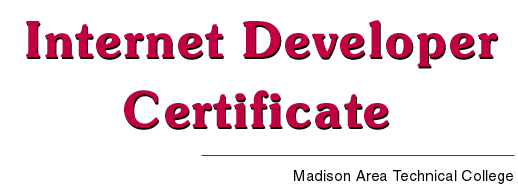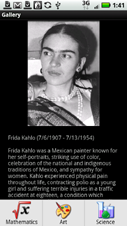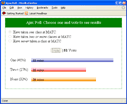
|
|
The Certificate is a sequence of connected courses which explore Internet software development, including Javascript, Ajax, Android, Java, Drupal, PHP, and MySQL. The certificate is open to graduates of a computing program or anyone with equivalent field experience. These are three credit courses, meeting two hours in the classroom each week for 17 weeks, with associated lab periods for student convenience. All sections are in the late afternoon and evening. Class work stresses hands-on programming through projects, and students are welcome to work on assignments at home or at work if they can access our servers and/or have the tools -- the Android SDK or PHP, for example. Most of these tools are free for anyone to download and use. Completing the Certificate takes two years by taking one course per semester, but the express track allows completion in one year by taking two courses per semester. To apply for the Internet Developer Certificate, download this application form in Microsoft Word format, fill out, and attach to Mike Bertrand. All applicants will be contacted by eMail shortly after submitting an application. Although four courses must be taken to obtain the Certificate, qualified 'special students' are welcome to take individual classes, room permitting (a certain number of seats are reserved for Certificate students). Applications are being accepted on a rolling basis. Accepted Certificate students are guaranteed their classes. Obtaining the Certificate requires taking four courses. Intro to Internet Programming (152-188) is required and should be taken first, because it develops a number of techniques and themes common to the rest of the curriculum. Not every course is offered every semester. Intro to Internet Programming-IDC (152-188) [Required] A survey of HTML programming, including client- and server-side scripting. HTML topics include basic web page layout and design, CSS, graphics, tables, forms, style sheets, and the Document Object Model / DHTML. JavaScript programming is covered intensively, including scripting basics, dynamic HTML production, arrays, and validating user input. After these foundations, we move to XML, Ajax, and ASP. This course is required for the Internet Developer Certificate and should be taken first. Drupal Development-IDC (152-187) [Elective] This course takes up all aspects of Drupal Open Source development, starting with installation, configuration, and base features. Core functions and modules are addressed, including users, content types, themes, menus, views, and jQuery. Module development with PHP is the central topic of this class, including with the form API against MySQL. Students should be familiar with HTML and CSS and be ready to program in PHP. This course is an elective for the Internet Developer Certificate. Android Apps Development-IDC (152-189) [Elective] This course introduces developing applications for Android devices. All the required software is free, including the Android emulator. It is not necessary to own an Android device, though the applications developed in the course can be deployed to one. Basic familiarity with Java and Eclipse (or willingness to learn them quickly) is assumed. Topics include Android layout and input widgets, both in XML and programmatically; menus and dialogs; gesture detection; graphics and the Android drawing API; database access with SQLite and file IO; location-based services (geo-location); and device dependency issues. This course is an elective for the Internet Developer Certificate. Java Programming-IDC (152-190) [Elective] This course is an introduction to the Java programming language from an object-oriented point of view. We start with Java basics: data types, class construction, control structures, method writing, and elementary event handling. Further topics include Java components and layout, mouse handling, graphics, string manipulation, remote data access, file I/O, network programming, and database access through JDBC. This course is an elective for the Internet Developer Certificate. Ajax, XSLT & JQuery-IDC (152-192) [Elective] This course takes up programming web pages with Javascript and jQuery. Ajax is a special focus, including against MySQL and server-side PHP scripts. The central role of CSS is emphasized throughout. Additional topics include Web Services, XSLT, RSS, and Google maps. This course is an elective for the Internet Developer Certificate. Advanced Android Development-IDC (152-195) [Elective] This is a second course in Android applications development, assuming a background in Android development and taking up more advanced topics, including geo location, web services and network programming generally, game programming, HTML 5 strategies, and graphics programming. More complex user interfaces are considered, including multi-activity applications. PHP & MySQL Programming-IDC (152-196) [Elective] This course is an introduction to PHP and MySQL and develops the basics of PHP web programming, including variables, control, functions, arrays, classes, and file I/O. Intermediate level SQL is taken up as well. Students develop a robust shopping cart application for an online bookstore, including initial database construction using web services, a web search engine, user authentication, payment handling through Paypal's sandbox, and transaction storage. This course is an elective for the Internet Developer Certificate. Flash & Flex Programming-IDC (152-199) [Elective] This course introduces ActionScript 3.0 programming in Adobe Flash. Students write programs using either Adobe Flash Pro or Adobe Flash Builder (formerly Flex Builder). Event handling and drawing with ActionScript are central topics. All major programming constructs are considered, including variables, loops, functions, object-oriented concepts, and file I/O (including XML). Programmatic Flash animation is a continuing thread. Additional topics include Flash forms, games, and drag-and-drop techniques. This course is an elective for the Internet Developer Certificate. |
|
For more information, write: Mike Bertrand Last updated December 8, 2012 |

